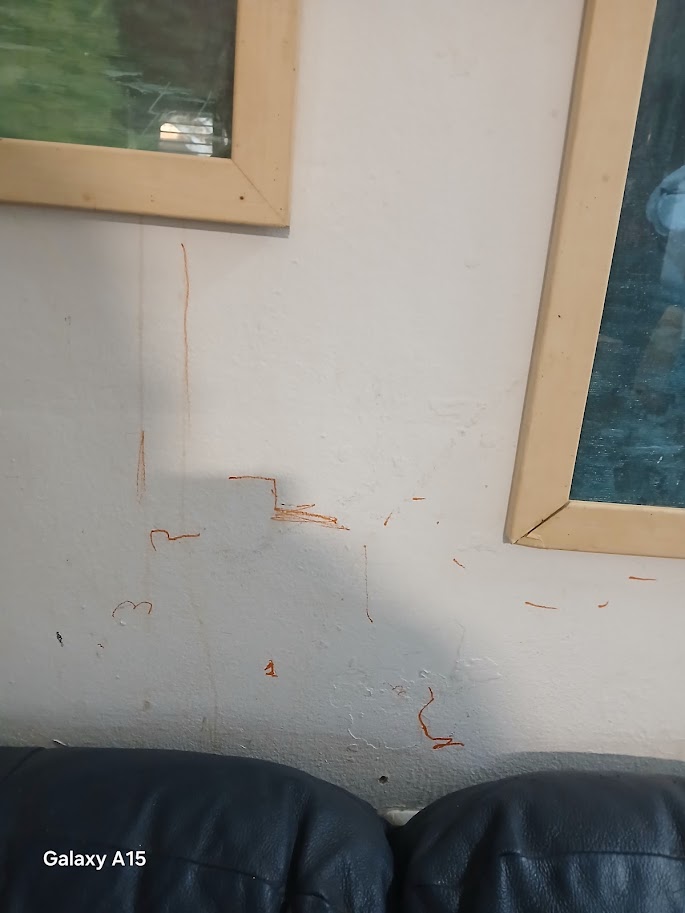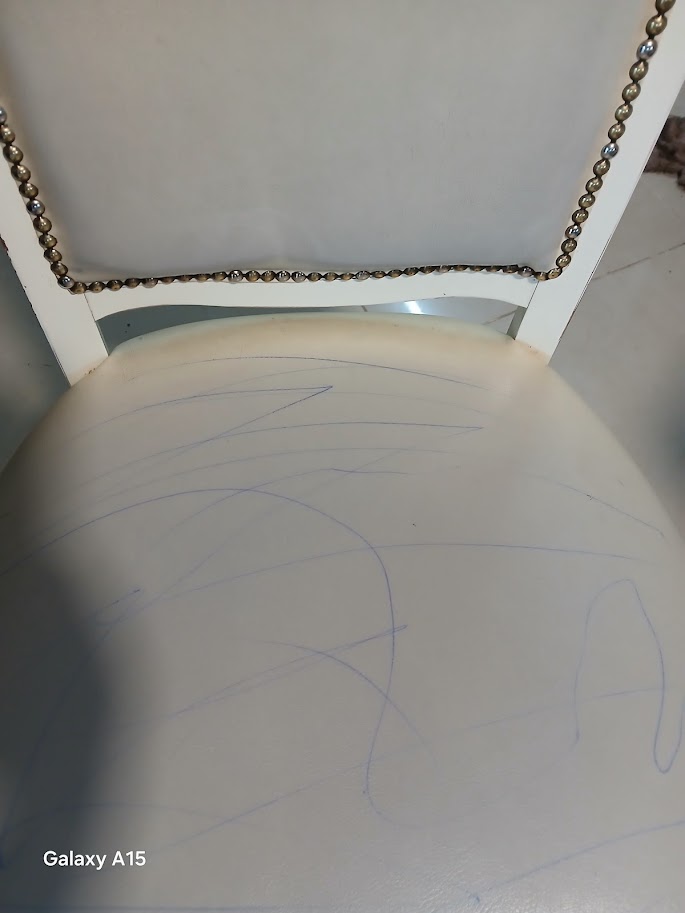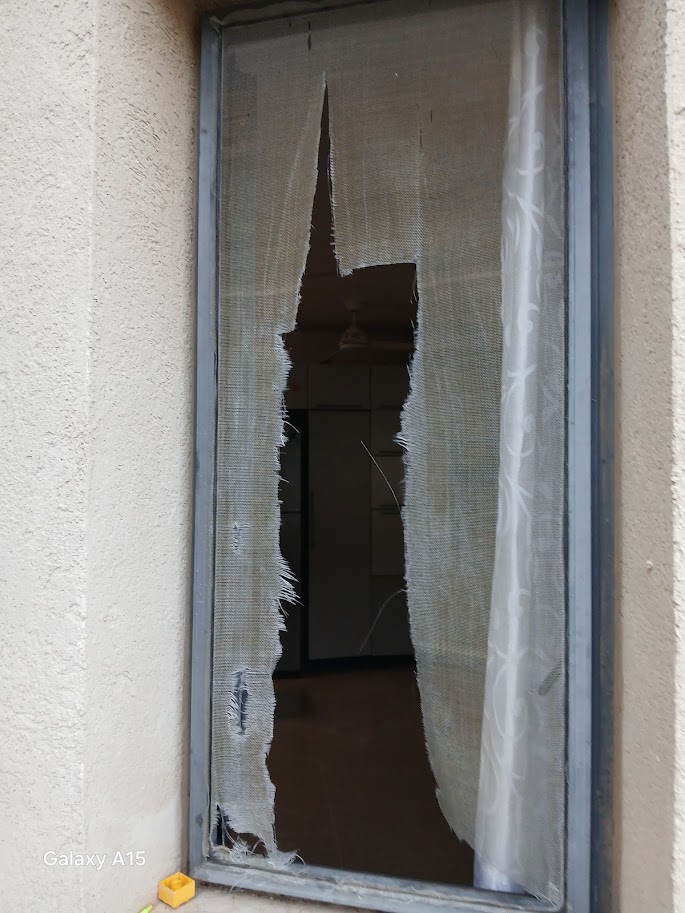Sometimes I watch ds7 and think it would be fascinating to document what he does and the time he does each thing – he moves incessantly from one thing to another, never stopping. Often I can detach emotionally and find it interesting and even laugh about the endless damages, but sometimes I feel frustrated and even furious. Over a year ago I stopped counting when he reached 12,000 shekels of damage. I may have stopped counting but the damages continue.
Within a day of the foster care agency representatives coming, the wall that was scrubbed was rescribbled on. A couple of days later, he colored on a different wall with a marker.

He climbed up to the pergola and unscrewed and took down some of the cross boards. He picked up a permanent marker and began coloring on a wall painting – fortunately the marker was a bit dried and I stopped him before there was damage.

He regularly throws his nighttime pullup in the toilet; sometimes I see it before anything else happens but a couple of mornings ago someone else did their business on top of it and by 6:30 am I was unblocking a nasty mess. He tugs and pulls and rips and dissassembles everything he touches, unremittingly.
After three months of no visitation with the children’s bio parents, visitation resumed three weeks ago in a mediation center an hour away. Our time slot is 5:30, so we leave at 4:30 and get back at 7:30.
On the way there dd7 began playing with a card game I keep in the car. When I heard ds7 in the seat behind me laughing over it together with her, I took a moment to ask myself if I was okay with that, since the likelihood it would be ripped into small pieces was about one hundred percent. I decided it was okay, that if he ripped a few of the cards it wouldn’t ruin the game.
What I wasn’t prepared for was for him to find a decorative pin in a storage compartment of the car (that he isn’t allowed to go into and that he can’t access with a seat belt on) and use it to gouge deep scratches on the inside of the car window while we were driving. When I realized what he did (thanks to dd7 alerting me – “Mommy, ds is breaking the window and making lines on it!”) – I felt angry, really angry. I pulled over, looked at the window, and asked what he used to make the scratches – he claimed he didn’t do anything after quickly dropping the pin between the seats to conceal the evidence.
As soon as I asked him what happened, his jaw went slack and his mouth hung open with his tongue partially hanging out while his eyes glazed over at half mast. I realize he’s emotionally shutting down because he feels scared – I’m sure there’s a trauma term for this – but it’s not endearing. He regularly responds as if I’m terrorizing him and while I know he has deep fears that are triggered by what seems like minimal stimulus to an outsider, his response doesn’t inspire compassion.
I looked at him very steadily for what felt like a long minute. Then I told him when I see him break things on purpose it’s not a good feeling for me and that I felt angry. I asked him what do we do when we’re angry? Do we hit someone? No, he shook his head. Do we yell at someone? No, he shook his head.
“Right, I’m not going to hit you and I’m not going to yell at you, but right now I feel really angry about what you did.” I took the pin he used, put it away and we continued driving.
Often I’ll catch him doing something, and calmly help him get conscious about what he’s doing: “What are you doing? Do you think coloring on the wall is a good idea? Let’s think, where would be a good place to color?” And then I redirect him to a piece of paper. And that’s fine until ten minutes later when he’s doing something else like using a screwdriver or knife to gauge a hole in a wall or the couch. Or Shabbos morning using scissors to cut the window screen and then ripping it wide open. (We’ve already replaced the screen on the screen door twice due to his gouging.) Or Shabbos afternoon pouring cement powder down into the new sewage lines.

As we drove I asked myself why I felt so upset in the moment about the scratches to the car window. I have patience most of the time, but sometimes the constant breakage and damage is so frustrating and I don’t feel a shred of tolerance left in that moment. I don’t expect a home with children to look perfect and mine certainly doesn’t! – but I’ve never experienced anything like this. The therapist said he’s like an infant in a big body, but I told her she’s wrong – an infant learns after a few reminders not to do it again. Even with all of the oversight and reminders, after almost two years he continues to do these things. It’s not as bad as it was in the early months but it’s still quite a lot.
He regularly smuggles house tools and knives out of the house and if I come upon him in the process I can tell just from the look on his face that he’s trying to conceal something from me.
At the meeting a couple of weeks ago one of the supervisors mentioned he has a disorganized attachment style. The moment she said that, it made perfect sense to me and it reminded me that I suspected it from the first time I heard his description, but I also had a feeling of, ‘Oh, no, not that!’ to have it be official. The disorganized attachment style is the most difficult to live with and is associated with the worst outcomes. The bigger surprise was that that despite knowing about the different unhealthy attachment styles, I never consciously identified the attachment styles of the twins.
I’ve always assumed ds does these actions without thinking, having almost no impulse control, but I’m increasingly wondering if it’s an unconscious self-sabotaging strategy to keep people from getting too close to him or liking him. I’m going to be meeting with someone to discuss it, because I feel like there’s more to what is going on than what I’m seeing. I wonder if maybe I have to do some deep healing of my inner child or something like that to move beyond my current emotional capacity because I’m not used to feeling this kind of anger and it really bothers me.
At the same time, I don’t want to shame myself for getting upset, because it’s challenging (I didn’t mention all of his other behaviors that are going on at the same time) and sometimes I wonder how anyone can be expected to stay calm all the time in the face of all that.
Avivah
I admire your ability to be calm until that point, I would not have made it that far!
I don’t know much about attachment styles and healing them, but maybe an appropriate response like anger while affirming his safety is actually helpful, instead of demanding superhuman tolerance?
I think it’s okay for children to see you’re upset and he could see I was angry in addition to me telling him. But my issue is the degree of anger I feel is something I’m not comfortable with.
Oy, Avivah! To say this is so challenging does not even scratch the surface!
It might be helpful to you to look at your anger as a “part” (as opposed to Self), which is what Internal Family Systems (IFS) does.
Parts need our understanding and compassion. They need us to understand where and how they developed, and that usually takes us back to childhood events and experiences and can help us to connect lovingly to our younger self. This work has been immensely powerful and healing for me.
As I’m sure you know, anger is usually a “cover part,” meaning that it is protecting us from sadness, hopelessness and/or deep grief.
That is not to say that anger is out of place for you given what you are experiencing. Quite the contrary!
But you mentioned that the intensity of the anger bothered you, and so I wanted to suggest something that has helped me.
Sending hugs and love your way!
Avivah, I was thinking not to post because really, I would have lost it many months ago . May Hashem continue to give you loads of strength to be able to give the children a very safe and healthy home.
I know that you have written about Yirmi lately but would really like to hear when you get a chance how Rafael is and with the twins.
Do you think he might be trying and trying to see what would happen if you get really really angry? And if it’s still safe for him if you do? Bear in mind I’m not a psychologist! Just what it made me think of! In which case sounds like you handled it really well. Makes sense he’d try a lot more than a toddler in safe circumstances if in the past he’s learned he is not safe.
I hear your comment but Avivah did write the little boy did damage already accounting for 12,000 shekel. When does the child face the consequences of his not respecting others things. That’s why I wrote above, I probably would have lost my patience long ago. This is an extremely special situation, and not easy at all. Avivah, Can you put DS in for time out? Would he be traumatized by this? (If you are in the same room. )
He really has no concept of consequences at all. I’ve wondered and thought about how to make the connection clear to him but nothing I’ve done has made any difference. It’s like a huge roadblock in his brain that doesn’t allow him to make connections; he doesn’t process that at all.
I often use time-in with him; he sits on my lap or next to me when situations call for him to calm down or he needs to be contained. He hates it and resists it until a couple of minutes go by and then he usually loves snuggling up next to me.
Well, I haven’t yet reached sainthood so he’s had opportunities to see me get upset, even very upset. I don’t think he feels safe with any anger or displeasure expressed but my anger has no deterrent value. His brain doesn’t process past experiences as something to keep in mind. It’s like whatever happened in the past, even five minutes ago, is completely forgotten and he’ll do something very similar even if someone has just gotten very upset with him a few minutes before.
Is this to do with trauma? I’m asking really out of interest because I’ve recently been reading stories of foster children with past trauma and how parents have been advised to parent differently eg “give in” a lot more in some ways to allow the children a feeling of safety. I don’t know much about this but just something I’m trying to understand. Have they given you guidance on how to handle it? Just sounds very challenging for sure!
Yes, it’s completely related to trauma.
Though there has been minimal guidance, I studied trauma informed parenting before developing Leadership Parenting, and then I did an extensive online course when I thought there was a possibility of the twins arriving to be prepared. My standard approach to parenting is aligned with a trauma informed approach, so for me there isn’t much difference except that I need to be very thoughtful and patient, to remember the source of what I’m seeing. But it’s true that for most parents it’s a very different way of parenting.
Thank you. This is interesting. Would you mind sharing some of the resources you used?
I love, love, love the work of Dr. Karyn Purvis, creator of TBRI – Trust Based Relational Intervention. I had her book for years before fostering the twins, but I took her online training course when I thought they might be joining our family, and did a viewing/discussion group of her sessions in my home for several months. I dreamed that one day I would be able to train with her in person in the US but sadly that dream was cut short when she died in 2016.
Thanks for the recommendation: I’m now half way through The Connected Parent and already a total fan. My children are not fostered or particularly traumatised but this way of parenting really speaks to me. Actually several of the tools I’ve noticed we use already just because we could see they work. Thank you! (Why don’t they teach this to all parents?)
I agree that this way of parenting is appropriate for all children; the difference is that kids with trauma must be parented like this or it will be a disaster. This is the approach that I’ve taught for years and it’s unfortunate that it’s not common.
Wow. This sounds like really tough behavior. When I worked in a school (where admittedly the behavior we were dealing with was nowhere as difficult as what you describe) we had consultants come in who taught us that the key to getting compliance from non attached kids is to have the positive interactions outnumber the negative interactions by a ratio that I can’t exactly remember—I think four to one? And for some of the kids this was really difficult because they required *constant* redirection and rarely followed directions. So the advice we received is that if we can’t say anything positive about their behavior we should compliment their physical appearance, like saying that we liked their sweater or something. It wasn’t a magic bullet, but being mindful of positive interactions far outnumbering negative interactions did help increase compliance—although again, the behaviors we were dealing with were not as serious.